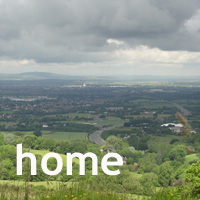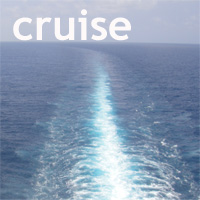Over the hills and across the desert
 Wednesday, February 3, 2016 at 3:52AM
Wednesday, February 3, 2016 at 3:52AM
I know that some readers will be interested to see the quality of the modern vehicle used for our transport today – actually for just 17 of us to ride in comfort. No squashing in here thank goodness.
Having seen the rigorous observations to safety protocols this morning, we were amused by this stylish take on the hi-vis and hard hat! I suspect she was a tour guide rather than a port worker though.
I took the chance to give lifeboat #1 a quick once over – just to make sure it was looking shipshape. Not that we have any plans, you understand!
Having all checked in with Miguel, our guide, we were off.
The town of Matarani didn’t look very appealing, though there was a shuttle bus for those who didn’t want to venture further afield on a tour bus. Heaven knows what they found to do there, apart from stock up on essentials, perhaps?
We were headed for Arequipa, a journey which would take us two hours, Miguel advised. Note the landscape – dry desert with white patches of volcanic ash here and there.
Totally inhospitable. We were driving along the Transoceanic Highway which begins in Matarani and ends in Brazil somewhere.
This first part stretches through an arid desert landscape without a sign of life.
But plenty of evidence that life has passed through. We were shocked at the amount of roadside rubbish the whole way along – mostly plastic bottles, some containing liquid of varying shades of yellow (eeeuw) and all of which will remain there until someone picks them up, because they are not going to decompose here any time soon.
Miguel told us about this part of the desert, which had been used for some research into Mars exploration because much of it has been dry for so long that there is a complete dearth of micro organisms here. Except that, as in other parts of Peru, some of the Andean people are choosing to stake a claim here by building a shanty, in the hope that some day they will achieve land rights. Miguel told us of a kind of mafia anarchy here, protection for these small claims built out on the desert and envisaged a time when these people might hold up the traffic on the highway for a while and insist on electricity, drainage and whatever else. Food for thought indeed – it appears a dry and barren desert to us, but clearly some see potential for gain at whatever cost to the environment.
Surprisingly, a little further on was a small lake, formed from irrigation water which runs off some agriculture nearby. The salt crystallises on the edges and creates yet another alien feature.
As we neared Arequipa, small strips of roadside cafes appeared, mostly for the trucks which are the main traffic on this part of the highway at least.
The land became more rocky with large boulders of volcanic rock now in demand for flagstones and decorative use in the building trade.
And sure enough, there in the distant clouds was the brooding culprit, El Misti, the volcano with no chimney. Just like Mount St Helens, it builds the power within a chamber – closely monitored, Miguel reassured us – which, someday, it will release by blowing its top. What a scary proposition to live with.
Thankfully, it didn’t blow its top this afternoon, so we continued on into Arequipa and eventually found ourselves in the city centre. There were times when I felt we’d never get here!
To begin with, we couldn’t really see the charm.
Even if it was interesting to see people shopping in these small. market-style “shops”, each with a single specialism.
But then the narrow streets broadened out into the Plaza del Armas, there was the cathedral and beautiful cloistered streets on either side and all was going to be just fine!
We got off the bus in a small side street and walked around the corner to the Museum.
No bags, no cameras, no phones…in fact, we were told there are sensors which would detect a phone signal, so better hand them in. Just put them on that table there in the corner, they’ll be fine….
What? No way! A small rebellion simmered….
Oh, tell you what, put them in these lockers here instead
So no photos of La Sarita or Juanita, the Ice Maiden Mummy whose artefacts were on display,sadly. Having said that, though, it was so dark, I very much doubt whether any decent pictures would have been created anyway, so instead, here’s a link. Whilst it was interesting to be there, I must say that Otzi in Bolzano is older and better displayed… But hey, we were in Arequipa, not in SudTirol, and we were just fine seeing what was here.
Having seen what there was to see, we had three quarters of an hour to take a look around the Square. Freedom!
We paid the small Jesuit church a visit. Like many buildings in central Arequipa it’s built of the distinctive white volcanic rock, beautifully carved and richly decorated.
I liked the remains of a painted surface on one of the side walls.
Making our way over to the Cathedral, we couldn’t resist popping into the shop selling tiny alfajores – small sandwich biscuits with dulce de leche, orange creme…and about a dozen other flavours. No, of course we didn’t leave empty handed!
The cathedral was rather busy and like many such places, a real centre of the community.
Two bright yellow booths outside were fresh air confessionals, with a young priest standing by to receive each person in turn from a queue stretching along the fence.
Inside was bright and airy, totally unstuffy and very much alive.
Thankfully one of the richly adorned figures in the glass cases high on the wall wasn’t too affected by the reflections from the windows opposite.
With fifteen minutes or so to spare, my hero and I wandered down a few back streets, trying to identify the source of some jolly music we could hear – we never found it though.
We did, however, catch sight of this beauty in her blue and white.
and a rather older, more soberly dressed Peruvian lady – but just look at those boots!
Time to meet the group now, though, and time for a sneaky shot of the “llama girls”, trying to snag unsuspecting tourists into parting with a few $$$s in return for a photograph.
Time to say goodbye to Arequipa then and to make our way back across the desert and back to the ship. I can’t tell you how relieved I was that, as always, it didn’t seem to take quite as long to get back as it did to get there.
When we walked up the gangplank, we sensed that it was about to be drawn up and we’d be away, but shortly after we reached our suite, the Captain announced a medical emergency which would involve a short delay. As I sit here and type, it’s 10.45pm and we just heard the engines start. I think we are away.
Tomorrow we plan to be in Chile – where the time is two hours ahead of Peru. Two hours short tonight then – isn’t that mean?
 Peru in
Peru in  cruise,
cruise,  fun,
fun,  travelling
travelling 








Reader Comments